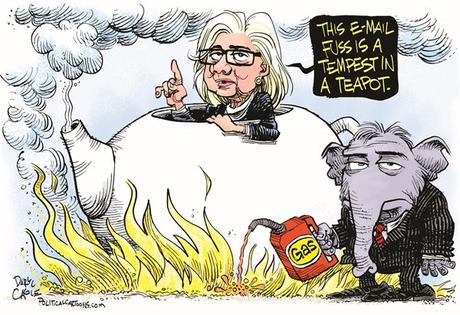 (The cartoon image above is by Daryl Cagle at politicalcartoons.com.)
(The cartoon image above is by Daryl Cagle at politicalcartoons.com.)With the help of congressional Republicans and their dishonest presidential candidate, the mainstream media has turned a mole hill into a mountain. They are treating Clinton's use of a private server for her e-mails while Secretary of State as though it is the primary issue in this campaign. It is not. There are many issues far more important.
Did Clinton make a mistake by using the private server? Yes, but it was nothing that the two previous Secretaries of State hadn't done. And we now have official word from the FBI that the server was not hacked, classified materials were not sent on it, and Clinton broke no laws or regulations by using the private server. But the media won't let the story die. They continue to allow Republicans to get on the air and claim Clinton broke the law.
The Washington Post says the e-mail story is out-of-control, and doesn't deserve the attention it has gotten. Here is what their editorial board has written:
JUDGING BY the amount of time NBC’s Matt Lauer spent pressing Hillary Clinton on her emails during Wednesday’s national security presidential forum, one would think that her homebrew server was one of the most important issues facing the country this election. It is not. There are a thousand other substantive issues — from China’s aggressive moves in the South China Sea to National Security Agency intelligence-gathering to military spending — that would have revealed more about what the candidates know and how they would govern. Instead, these did not even get mentioned in the first of 5½ precious prime-time hours the two candidates will share before Election Day, while emails took up a third of Ms. Clinton’s time. Sadly, Mr. Lauer’s widely panned handling of the candidate forum was not an aberration. Judging by polls showing that voters trust Mr. Trump more than Ms. Clinton, as well as other evidence, it reflects a common shorthand for this election articulated by NFL quarterback Colin Kaepernick last week: “You have Donald Trump, who’s openly racist,” he said. Then, of Ms. Clinton: “I mean, we have a presidential candidate who’s deleted emails and done things illegally and is a presidential candidate. That doesn’t make sense to me, because if that was any other person, you’d be in prison.” In fact, Ms. Clinton’s emails have endured much more scrutiny than an ordinary person’s would have, and the criminal case against her was so thin that charging her would have been to treat her very differently. Ironically, even as the email issue consumed so much precious airtime, several pieces of news reported Wednesday should have taken some steam out of the story. First is a memo FBI Director James B. Comey sent to his staff explaining that the decision not to recommend charging Ms. Clinton was “not a cliff-hanger” and that people “chest-beating” and second-guessing the FBI do not know what they are talking about. Anyone who claims that Ms. Clinton should be in prison accuses, without evidence, the FBI of corruption or flagrant incompetence. Second is the emergence of an email exchange between Ms. Clinton and former secretary of state Colin Powell in which he explained that he used a private computer and bypassed State Department servers while he ran the agency, even when communicating with foreign leaders and top officials. Mr. Powell attempted last month to distance himself from Ms. Clinton’s practices, which is one of the many factors that made the email story look worse. Now, it seems, Mr. Powell engaged in similar behavior. Last is a finding that 30 Benghazi-related emails that were recovered during the FBI email investigation and recently attracted big headlines had nothing significant in them. Only one, in fact, was previously undisclosed, and it contained nothing but a compliment from a diplomat. But the damage of the “30 deleted Benghazi emails” story has already been done. Ms. Clinton is hardly blameless. She treated the public’s interest in sound record-keeping cavalierly. A small amount of classified material also moved across her private server. But it was not obviously marked as such, and there is still no evidence that national security was harmed. Ms. Clinton has also admitted that using the personal server was a mistake. The story has vastly exceeded the boundaries of the facts. Imagine how history would judge today’s Americans if, looking back at this election, the record showed that voters empowered a dangerous man because of . . . a minor email scandal. There is no equivalence between Ms. Clinton’s wrongs and Mr. Trump’s manifest unfitness for office.

